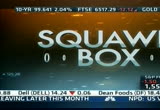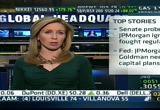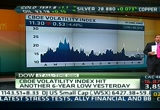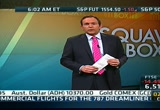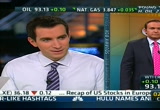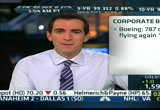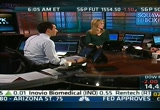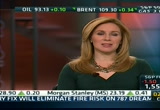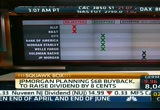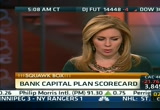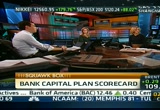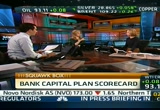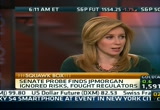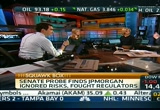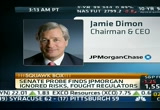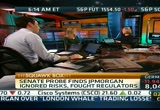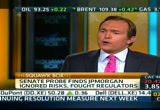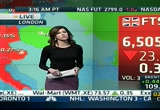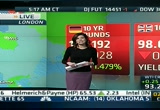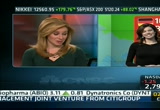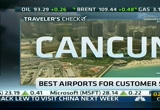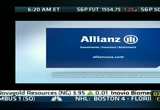tv Squawk Box CNBC March 15, 2013 6:00am-9:00am EDT
6:01 am
6:02 am
andrew ross sorkin. brian sullivan. joe will be back from vacation on monday. let's get right to the news of the morning, though. a senate committee will grow current and former jpmorgan executives today. at issue is the bank's handling of the london wale trading losses. ahead of that hearing, a scathing report was released last night suggesting that jpmorgan officials ignored growing risk and hid losses from regulators. it accuses the bank of changing risk model toes work around capital rules. ceo jamie dimon comes under heavy criticism from the senate panel. he is not scheduled to be among the bank officials testifying out there today. although some are wondering if he will show up and defend himself. it was a rough night for jpmorgan. in a separate story, the fed is telling the bank and rival goldman sachs that their plans for maintaining proper capital levels are weak.
6:03 am
regulators are ordering both firms to revise their capital plans by tend of september. the fed turned down similar requests from allied financial and kayla tousche is here with more on this story in just a few minutes. but first, brian has a look at the markets this morning. brian, welcome. it's great to see you. >> i wish i could say the same thing, becky, but it's early. i can't believe you guys do this every day. listen, becky, the dow extending its winning streak to ten straight sessions. we have not seen a string of gains like this since jerry mcguire was the number one movie in america. we're talking 1996. the s&p took a late day run at its record closing high, but couldn't quite get there yesterday. and people seem pretty relaxed. the vix, the fear gauge hitting another six-year low yesterday, as well. now, the trend has certainly been our friend. get this. the dow has not been down any friday this year.
6:04 am
futures today, they are down a fraction, but not a whole lot. but how about this? if we rise today, guys, it would be the first 11-day winning streak since late 1991 going into 1992. and there's plenty of economic data, as well. excuse me. it is early. we start at 8:30 eastern with the february read on inflation. the economists expect headline cpi to rise by 0.6%. while the core component kicks higher by a more modest 0.2%. in other words, inflation expected to maintain. at 9:15 a.m. eastern, we're going to get industrial production and find out how much capacity to utilize in march. speaking of the markets and the economy, our own steve liesman caught up with new treasury secretary jack lew yet. among the topics discussed, whether there is a reason to worry about a bubble right now.
6:05 am
>> the analysis i've seen doesn't give me reason to be worried right now. i think one of the lessons we learned from 2008, 2009 is that even when things are not a problem, we always have to ask those questions. we need to make sure that our -- we have the transparency to see what's going on in firms, in markets. we need to have the regulatory tools to deal with problems as they develop. >> and we're going to talk more about the markets and questions about a potential bubble later on this morning. we've got a great guest lineup today, guys. named money manager bill miller of legg mason and former fed chairman alan greenspan. we're going to find out if he sees any similarities between today's environment and the situation back in 1996. the last time we had this kind of run when he gave his now famous irrational exuberance speech. andrew, first, give us more of the morning's top stories. >> before we do that -- >> jerry mcguire is an
6:06 am
incredible statistic. i feel like we're jinxing these guys. the dow is now looking for its 11th straight day of gains, its 11th consecutive friday of gains. it hasn't been down any day in march or any friday of the year. guys, i feel like we're starting to jinx it at this time. it is the ides of march. >> we are going into st. patrick's day. >> andrew did not. >> neither did you. >> whoa. >> i've slipped right into joe's role. i poofed my head this morning. >> it looks good. he would be proud. let's talk about another couple of corporate headlines this morning, including boeing. anyway, here it is. boeing says it is confident it could have its grounded 787 dreamliner jets flying again in a matter of weeks. the company has unveiled its proposed weeks for the aircraft battery system. boeing says changes will be
6:07 am
eliminating the risk of a fire. it calls the battery recertification process about one-third of the way complete. samsung unveiled its galaxy s4. the device can stop and start videos depending on whether someone is looking physically at the screen. the s4 will be available by tend of next month. and another problem for carnival cruises. these guys can't get it together. the carnival legend is having technical difficulties affecting its sailing speeds. within the last month, though, three other carnival cruise ships have reported problems and you remember the big one. the triumph had the -- >> i didn't realize there were three. >> you had the dream yesterday. another ship yesterday called the dream which had some issues. a passenger apparently called the coast guard and said, come help us. so you have to wonder, is this
6:08 am
bad luck with carnival or -- >> it doesn't sound like it's related, though. yeah, but four of the five last cruise ship problems have all been carnival. at and point you stop saying, this is a random thing. >> do you cruise? >> no. i can't be locked up like that at sea, man. >> you know what? i would expect that to be the answer. i would think you would have a hard time with it. >> i'd be running laps on the ship, probably jump off, swim back to shore and do something stupid. >> when you see do you cruise, that is a question we've been asked. >> it's a whole thing, right? it's a lifestyle. i'll not a big buffet guy, either. why? >> owes, that's buffett, sorry. let's get back to the other big story of the money. the fed's stress test and the scathing senate report on the jp london wale, kayla tousche is
6:09 am
here with a lot of ground to cover. >> there is, becky. and i'm sorry to break up the cruise party with the somber news. yesterday the fed showed which of those plans passed muster. allied and bbt saw their plans rejected by the fed. american express was asked to go back to the drawing board but had its revised plan which was ads 4 billion buy back and a dividend hike. that was approved on the second try. most of the remaining banks saw their plans arofd. citigroup, wells fargo, goldman sachs and jpmorgan were conditionally approved by the fed. the amount they said was fine, but the federationed internal flags about the model the banks used internally to plan for crises. now, it won't inhibit them from giving back money to shareholders for now. shortly after the fed released, jp morgan said it would raise dividends and it's buying back 6
6:10 am
million in its own stock. it will up its bank to 330 cents. also taking out $5.5 billion in its most expensive preferred shares. a few things, though, guys region are clear. the fed tests are getting tougher the farther we get out trt crisis, especially tough for banks that have that trading expose wrur. in the future, banks will be returning less capital than they used to. >> kayla, thank you for that. so here is the question. we have a lot to talk about. are you going to come over here? >> am i invited? >> you're invited. >> i think you're supposed to come over and sit down. >> we have to have a conversation about a lot of this stuff. >> first of all, the bb&t stuff, that came as a big surprise. allied failed to test to begin with. my guess would be, kayla, that that was one of the more surprising issues. or am i making this up at this point in time?
6:11 am
>> bb&t was interesting. >> i'm going to take my seat here. sit here. i'm a gentleman. >> thank you. how nice is this? i think you're coming by for a quick segment. >> i'm tall enough to stand down here and still -- >> wow. >> there is a discrepancy about what happened. you could get rejected on a quantitative basis saying you're feeling too much capital. that's what happened to allied. what happened to bb&t was rejection on a qualitative basis. i.e., something was wrong with the way bb&t was planning to figure out how much they were going to allocate. interestingly, all the banks who were rejected the first time around had the ability to come back and resubmit a plan. but there were issues with the way bb&t was reclaking its own risk. >> do we care about what happened to jpmorgan and goldman? how much do we really care?
6:12 am
>> we do because this is what makes you feel like things are getting tougher for the banks. jpmorgan last year sailed through with flying colors. this year they only got approved and there's the buyback -- >> but people always said we wanted pro cyclical capital requirements, meaning in better times we would actually start requiring people to raise more and that actually -- you didn't want people doing this when things were offer. this is always the concept, this is what's happening. >> but i think what's happening is a lot of these banks are changing their business models. the closer we were to the crisis, everyone knew that we would fail if anyone made them too tough in 2009. now they're trying to shore up their capital basis, but they're still not at that optimum level where they have enough to back it up. >> can we switch gears. that senate report was much more scathing than i think a lot of people had been expecting.
6:13 am
it raised some questions that i hadn't even considered or thought of before. what's right? and i'd like to throw this out to the table. they made some stinging management about accusations. >> in fact, they've reached their internal risk controls. they've breached them 330 times. that's no small feat. >> so what's the liability here? when a congressional report comes out and says -- or a senate report comes out and says, they had over $16 million in losses -- >> that's very different. >> you could be looking at a criminal situation. >> you could. but at minimum -- >> does anybody know if this is bluster coming from washington? is this legitimate? this is very different than how we've talked about this to this point, which is, look, this is a loss to the company. companies make mistakes. jpmorgan has been able to handle
6:14 am
it and has dealt with it. >> on the july 13th call last summer where jpmorgan said we're going to oem open the kimono, you guys talked about it on squad, they were convinced that there was some sort of issue going on. they were duped by the trader here. but it's interesting, the operating committee at jpmorgan meets every wednesday all day. even if this is something that was going on at the cio, every single top executive would have known what's going on. >> in the past, i thought this was a rogue unit. the accusations suggested that jamie dimon himself didn't want some of these things turned over to regulators. they accused hirm of withholding information. >> and that he knew about the size and complexity of the portfolio. >> right. and that was not my understanding at all of the system. >> so basically, you've got one of two situations, right? they either don't know what they're doing. they have bad risk management, which makes you nervous. or they're misleading investors
6:15 am
and you this knew what they were doing and that makes you nervous. >> i was of the impression that this was a once off. >> two things will definitely happen coming out of this. one, expect a lot of lawsuits. investors who were unclear as to whether they saw any monetary damages to their share price because of the year because of this are going to say the senate report is saying we were probably misled here. also volcker. senator levin is one of the lead authors on that rule. this is basically pointing to the fact that, guys, as a hedge that it was a profit. that is what this entire report is about. >> why is jamie dimon not getting called today? in this report, he's being accused of basically trying to intimidate people out of not providing information to the government. >> right. >> that's a whole different
6:16 am
level. >> it's different and it's really -- i mean, there are some speculating that jamie dimon would actually show up. >> i don't know. i think that's a huge long shot. i don't know anybody would -- but there are some people who -- >> ben white. >> and he's talked to a lot of people internally who support jamie dimon, banking officials who support him who say the same thing. thou, i think it's crazy that they would show up, but i can imagine somebody like jamie dimon was probably really ticked off when he reads that. >> it's now a famous quote, he says it's -- to the tea party, right? yes changed his mind when he said that. >> this is turning into a shakespearean drop. >> on the ides of march. >> if i am sitting on the senate committee -- >> are you? >> i am not. >> but i think people are wondering that. >> i would probably not want jamie dimon to testify there.
6:17 am
i would want to hear from those actually making the decisions. and jamie has testified in front of these panels, oftentimes the tables have turned. he set the agenda. >> why did ina drew not take a lot of heat in this report? she's mentioned throughout, but she is not the target of this own though this was her group. >> i'm understanding last year she was ill for the bulk of the time this was taking place. so she was intermittently involved and maybe not as involved as she had been in the past. but that is unclear. >> did you read the messaging transcripts of these traders? >> he's saying we're idiots. >> like they're going to rake us over the coals. when you read these e-mails you're like, these are the guys managing jillions of dollars? bad grammar, misspellings. we're doomed.
6:18 am
>> doesn't exactly boost your confidence? >> that's what i'm saying. these are people in charge of hundreds of millions of dollars in a portfolio and now we know more than that. but you read these transcripts and it's like, rotf lol. come on. >> not exactly a compliment. point made. kayla, thank you. >> and, brian, thank you for giving up the -- what a gentleman you are. >> trying to bring some class. >> you know, joe would not have done that. >> time now for the global markets report. in fact, let's go to london where the infamous london wales was based. kelly. >> brian, guys, hi. let me just give you a quick sense of what's been happening in trade over here. london wales story not a major one as far as local media is concerned. it was last year. frankly, some of the stuff coming out on gold has the market's attention here. in any case, italy's parliament
6:19 am
is meeting for the first time since that inconclusive election which has led them without a clear sense of who will be ruling the next government. the ftse mib is one of the bourses trying to outperform 2d. the others are broadly in the red. it will be an uphill climb as the trading session turns towards the u.s. today. here is a look at the space, ow of the peripheral and into saver havens. giving that we're getting this clear session today, a lot of people expecting another round of election necessary a couple of months. spain is weaker today, 4.86%. the construction has widened considerably against spain. that's a interesting development to watch. but if you're really trying to gauge what's happening, if you really want a sign, cnbc last night went to the launch of mila
6:20 am
kunis as the global brand ambassador. we wanted to know, you know, what is mila doing in the market? and if you believe in contrarian indicators, take a listen. >> i guess i would start educating myself a little bit more. i just started investing in stocks. i'm an advocate of, like, put things in the bank, put it in a cd, lock it away, be safe. and i've been pushed forward to take chances and i'm learning a little bit about the stock markets and companies. >> what kind of stocks? >> listen, what kind of stocks? no. >> mila, typically conservative with her cash, guys, moving into stocks. i thought you might like that one. >> kelly, when we saw that earlier we all did a double take and it is that looks lks lmila. sure enough, that's her. >> i can't listen to her seriously without thinking she used to date macaulay calken.
6:21 am
i know she days aston cusper now, but -- >> we'll track down some other celebrities and actors, too. what was the old example of asking the taxi drivers, the shoe polisher. mila is moving into the market. maybe there's something to it. thank you. when we come back, we're going to talk about rising gas prices. [ male announcer ] you are a business pro.
6:22 am
omnipotent of opportunity. you know how to mix business... with business. and you...rent from national. because only national lets you choose any car in the aisle. and go. you can even take a full-size or above. and still pay the mid-size price. i could get used to this. [ male announcer ] yes, you could business pro. yes, you could. go national. go like a pro.
6:24 am
6:25 am
take a look at u.s. equity futures, see how the market is setting itself up. dow would be up about 16 points, fass dak would be off about 1.30 and s&p 500 off about 2. let's talk about the headlines this morning. you're seeing jcpenney there on the screen. shops will be opening inside several hundred jcpenney stores today. this marks a key element of the turn around for the struggling retailer. >> last year, we had pretty much the same merchandise priced differently. this year, we've got a lot of new merchandise. joe fresh comes in in about six weeks. you know, the home transformation is done in may. and so the new jcp is coming out of the ground and we think that's going to allow us to return to grow. >> ron johnson is hoping this could be a key part of his efforts to draw a new, younger audience, but you have to cross your fingers for ron johnson at this point and look at that
6:26 am
stock. is joe fresh fresh enough? we've talked a lot about jcpenney on squawk. we've talked a lot about the story. they burned $9 huven million in cash. they've got about dollars 900 million left. they have bonds due in 2036. >> the cash burn has accelerated. >> yes. >> and they still have to do a lot move renovations to get there. >> and every renovation is very expensive. number one, can they basically make it with their liquidity positions. and number two, who would have thought jcpenney would become one of the hottest contested stocks in the world. it's up there as a battleground stock. >> it's a dubious distinction. and probably fought one that another one wants to see in that
6:27 am
position. watching same-store sales, though, it was a decline of something like 30 plus percent. this has been a year of declining sales numbers like that and that is just a disaster. once you drive people out of the store, you better get new -- >> here is the real problem. i talked to retailers last week. they keep raising it so they're opening all these new things inside jcpenney. they have a nar of what jcpenney is supposed to look like. right now, they have a quarter of it done. if they decide they have to stop halfway in, the stores have to be redone. it's being done so that eventually you get around half the store. have you been in jcpenney lately? it's been interesting. the question here for jcpenney is can you change your customer
6:28 am
base? >> right. a risky strategy is a retailer. you kicked out the old customers and you better hope the new ones show up. >> they said basically we want to reconnect with our prior customers. >> we alien ated them out. >> we're going to find out. listen, if it works, it's going be one of the greatest retail turn arounds in history. it will be a harvard business school studies. ron johnson will get paid. >> it's been a fun story and we will continue to watch it. we've also been keeping an eye on oil prices. light sweet crude has been hovering around $90 a barrel mark. it's set to post its second grate week of gains. meantime, brent is trading
6:29 am
higher, add to go a string of positive reports we've had in the united states. joining us now is ed moore. ed, what's the new normal? is $90 where we should be looking at things because we thought we were getting towards $100 and potentially even yaut beyond. but over the last couple of weeks, price ves come back down substantially. now people are wondering if this is where we should be. >> actually, the oil market, like a lot of the other commodities market started as a reset. all the gains of january were given back in february. oil is at exactly the level where it was trading on january 2nd. >> it is? it got scary i guess in the month of january as prices really stepped up, increased, and it pushed prices higher at the pump, too, which people thought this was going to be a big heavy tax on consumers this year. >> the pump price was getting up there because the gasoline wasn't being made.
6:30 am
we still haven't seen what might happen this summer. gasoline produces have never been as high in february as they were last year. so that's something to march. but the crude market had a lot of inches, the chinese economy looked like it was rip roaring in gdp dpoeth. and both of those were kind of head fakes at the beginning of the year. the chinese had new refining capacity, they're using it and pushing product out into the world market. >> we have been watching a lot of new production that's coming online in the united states. and people think that that could be the thing that really pulls us out, a new job creation, a new economic stimulus coming from energy. are you in that camp? >> actually i was among those who started that camp. i got on to that bandwagon pretty early. we think gdp could be by 2020 three full percentage points higher than it would be without the oil, the jobs created will
6:31 am
be somewhere between 3 million and 4 million new ones that otherwise wouldn't be that. that current account dif set is going to impact positively for the country and positively for the dollar, but the really good news is on the nice gas side. we have a market that stalled out and demand takes a lot of capital expenditures. we're seeing it with a record number of new plans, chemicals, fertilizers, it's going to be a remarkable rebound forestry in the u.s. >> what happened to natural gas prices when all of that demand is built out? do you get back to a level of $5, $6, $7 for natural gas? >> we used to think that. well, we see it actually with producer hedging. 425, lock in the price and it goes up again. the production base is like an
6:32 am
accordi accordion. the shell play is very different from conventional gas or conventional oil. >> it's been more than three years since we've seen $70 oil. really, in fact, a brief drop in 2009 to 60. but other than that, it's been about five years. is $70 oil over in our lifetime? >> never is a difficult word to use when it comes to prices. from 1987 to 2003, was that $211 a barrel? solidly. then we had wild volatility. now it's settling in a $90 range. i think we're moving to a mean reverse, a new one at 90. we think the bottom is in the $75 to $80 range for that, but surely it would be --
6:33 am
>> so $3.50 is gas is here to stay for our "squawk box" viewers, correct? >> that's a different question. we forget that five years ago we got a peek in u.s. global demand and that was five barrels a day higher than what we had in january. >> thank you very much for coming in. i hope you'll come back again. coming up, the the picture from the futures pits in chicago. but first, as we head to break, let's get a look at yesterday's winners and losers. i need you. i feel so alone. but you're not alone. i knew you'd come.
6:34 am
like i could stay away. you know i can't do this without you. you'll never have to. you're always there for me. shh! i'll get you a rental car. i could also use an umbrella. fall in love with progressive's claims service. i have low testosterone. there, i said it. how did i know? well, i didn't really. see, i figured low testosterone would decrease my sex drive... but when i started losing energy and became moody... that's when i had an honest conversation with my doctor.
6:35 am
we discussed all the symptoms... then he gave me some blood tests. showed it was low t. that's it. it was a number -- not just me. [ male announcer ] today, men with low t have androgel 1.62% (testosterone gel). the #1 prescribed topical testosterone replacement therapy, increases testosterone when used daily. women and children should avoid contact with application sites. discontinue androgel and call your doctor f you see unexpected signs avoid coof early puberty in a child,. or signs in a woman, which may include changes in body hair or a large increase in acne, possibly due to accidental exposure. men with breast cancer or who have or might have prostate cancer, and women who are or may become pregnant or are breastfeeding, should not use androgel. serious side effects include worsening of an enlarged prostate, possible increased risk of prostate cancer, lower sperm count, swelling of ankles, feet, or body, enlarged or painful breasts, problems breathing during sleep, and blood clots in the legs. tell your doctor about your medical conditions and medications, especially insulin, corticosteroids, or medicines to decrease blood clotting.
6:36 am
so...what do men do when a number's too low? turn it up! [ male announcer ] in a clinical study, over 80% of treated men had their t levels restored to normal. talk to your doctor about all your symptoms. get the blood tests. change your number. turn it up. androgel 1.62%. get the blood tests. change your number. turn it up. investor. yeah, ibut i'm a busy guy.or it used to be easier but now there are more choices than ever. i want to know exactly what i am investing in. i want to know exactly how much i'm paying. i want to use the same stuff the big guys use. find out why nine out of ten large professional investors choose ishares for their etfs. ishares by blackrock. call 1-800-ishares for a prospectus which includes investment objectives, risks, charges and expenses. read and consider it carefully before investing. risk includes possible loss of principal.
6:37 am
welcome back to "squawk box." michael gherkin, mike, i have no idea why you're up this early, but we do appreciate it. we have not been down in the equity markets one friday this year. we are perfect, like the black hawks used to be. will we continue to be so this friday? >> i would not be surprised if we actually finished lower, brian. this 1562 level was pretty critical about a month or so ago on this same program on a retracement. here we are, lo and behold. so let's see if we hold our first level of resistance with some good sell orders, in other words, taking profits. >> why have we been up ten days in a row? are people scratching their head there tcme? because volume stinks. >> volume does stink, but it's not as simple as, hey, let's look at the yield in the ten
6:38 am
year. that's not producing enough grab for us or the fact that the dollar has gone whipsaw tr being beat up so far to now coming back to life. it's the fact that the equity markets have proven that there is still more up side and lo and behold, some of the yearly targets we're reaching already in the first quarter and, you know what? if something is a winner, you don't really take it off until it's necessary. so that's one of the reasons i think momentum will continue, at least to the point that we're at today. >> michael gurka, thank you, my fresh. appreciate it. >> thank you. when we come back, fed has spoken the we'll talk about which banks received their dif dens and launched their share buy back. plus, why some say jamie dimon should just show up at today's london wale hearing. let's take a look back in history. do you remember what happened five years ago tomorrow? march 16th, five years ago. think about the answer.
6:42 am
welcome back to squawk, everybody. our on this date in history is what happened five years ago tomorrow? on march 16th, 2008, bear stearns agreed to be bought out for $2 a share by jpmorgan. andrew nailed this, immediately knew the answer to this. we should have known you would. brian and i had stupid guesses. >> it also means you need to get out more, let's be honest. because you did, you're like bear stearns and which is and that and is i'm like, korea, why do you know this? >> march 22nd, a march 23rd, a week later what happened? anybody? >> it was six days later. >> it went from $2 to $10. >> they doubled the bid. >> he did write the book.
6:43 am
this is why he knows every one of these books. it's em blased on his brain. >> if you get me into september of 2008, it gets much worse. i can go hour by hour with you. >> all i remember about september of 2008, i was sent to new orleans with no clothes, nothing, and sat on top of the treasury building for five days and bought clothes. and i remember going to capitol hill on a sunday and doing some reporting and i had a couple of people, senators, congressmen, i will not name to protect the incident who asked me what a credit default swap was? and i knew then we were in big trouble. >> there you go. >> oh, boy. speaking of the financial crisis, former lehman's cfo aaron callen will appear on nbc's rock center tonight. she chose not to discuss lehman
6:44 am
and instead focus of her op-ed and cheryl sandberg's lean in. >> there is a lot to say about that experience, certainly, during that six months that i was cfo. but i won't do that at this time. i may in the future. but on a completely ternl level, it was chaos. it was a dramatic situation. it's not hard to understand that. i was new in my position. i was trying to learn the job while i was doing the job and can with a set of, you know, global events that had been put in place and that were developing that made it very, very difficult to try to manage the day-to-day. and i think it would be fair to say i didn't really, during that chaotic the period, get a lot of time to think about what is happening and what is this going to mean and could i sustain
6:45 am
this. i was sort of getting up every day just trying to get through the day to the next day. and i think a lot of people who were involved in the financial crisis in had some similar feelings. >> watch the entire interview tonight on rock center at 10:00 eastern time. >> we have a number of financials this morning and is jason goldberg who covered that sector for barclay's this morning. >> good morning. >> let's go through it. let's start with jpmorgan. i want to know about the liability. i imagine you've read through this report. it is scathing. there are accusations of intimidation and nondisclosure. i could see a wrath of civil cases and i wonder frankly if there's the possibility of a criminal case. it. >> it's certainly something to watch. we've obviously skimmed through all 307 pages on top of all the stress test results last night. so a busy evening.
6:46 am
a lot of things to parce through. >> you build model owes this stuff. are you building a new levels of liability based on this report? do us it's political grand standing? do you think there's truth to it? how do you see it? >> clearly, there's other investigations going on by the doj and the s.e.c. on jpmorgan that we're keeping an eye on and could this bring additional actions? that's quite possible. >> lets talk about the stress tests. it seems to be the surprise to the market. was it a surprise to you? >> yeah. i think the one thing that you've learned last week is it did appear for both of those companies, you know, their own estimate on kind of what the teacher looks like on their stress scenarios differ greatly tr what the fed expectations
6:47 am
were. and it sounds like the fed maybe wasn't entirely in tune with the way they're looking at the future and wants them to be more on their level. >> so when they say they have to resubmit their plan, wa does it mean in practice and what does it mean to your model? >> not much. jpmorgan came out last night with their buyback expectations and we expect them to do that in the same manner and fashion they would have had they passed the test originally. we think they have to go back and is relook at some of their models and the forecasting ability. but at the end of the day, it doesn't change our forecast. >> but it has to change something inside the bank, no? >> clearly it's policies and procedures and we think they have to continue to fine tune -- >> so this is not really about increasing capital at the bank? there's not any real math, there's not any rule new money that has to get put against this? >> correct. >> let's talk about bank of america. >> they came up with a $5
6:48 am
billion share buy back. we were looking for 3 million. they opted not to raise the dif accepted. it's hard to disagree with that decision. >> bb&t. bb&t was a disappointment. they did increase their dividend in january. we were hoping for a buyback. it looks like the fed came out and said there are qualitative issues with them and they're going to have to resubmit and probably won't be back into the market until the third quarter at the earliest. >> take a huge step back. financials have been on quite a run here. where do you think this is all going right now? >> you know, as we look out, you know, the majority of banks, you know, came out last night, increased their dividends, most banks are now buying back stock. you've got capital at record levels. you have most banks growing earnings and improving credit quality. so from a balance sheet perspective, the industry is quite healthy. it would be better if the revenue environment was more healthy, margins under pressure.
6:49 am
>> real quick, who don't you like? >> coming out of the stress tests, bb&t was a disappointment. >> jason, thank you for joining us. >> thank you. still to come this morning on squawk, legendary money manager bill miller, former fed chairman alan greenspan and airlinan investment and chairman ceo john rogers. that is a heck of a lineup. first, it is 5:00 somewhere and with st. patrick's day right around the corner, we are ready to crack up against this morning with the cfo of did i agio. he's going to pull up a stool and join us bringing beverages. can't wait. revolutionizing an industry can be a tough act to follow,
6:50 am
but at xerox we've embraced a new role. working behind the scenes to provide companies with services... like helping hr departments manage benefits and pensions for over 11 million employees. reducing document costs by up to 30%... and processing $421 billion dollars in accounts payables each year. helping thousands of companies simplify how work gets done. how's that for an encore? with xerox, you're ready for real business.
6:51 am
otherworldly things. but there are some things i've never seen before. this ge jet engine can understand 5,000 data samples per second. which is good for business. because planes use less fuel, spend less time on the ground and more time in the air. suddenly, faraway places don't seem so...far away.
6:53 am
welcome welcome back, everybody. more than 13 million spirits will be poured this weekend for st. patrick's day on sunday. we have the cfo of did i ageo north america. this is a really big deal for you all, this holiday. >> it is a great holiday for us. we're excited to celebrate st. patrick's day with our great brands, iconic brands with history and tradition in ireland. and people can enjoy them for st. patrick's day
6:54 am
>> he was doing research about how big a drinking holiday this is. when it falls on a sunday not necessarily great news. >> the whole month of march is great for guinness. march is guinness month. so falling on sunday is a great opportunity for consumers to really enjoy the entire holiday weekend with brands like guinness. >> so saturday is a big selling day too. >> friday night, saturday, sunday, yes. >> there was a whole lobbying market in certain markets to allow people to sell alcohol on sunday specifically because of this issue. did you guys get involved in that? >> we look at alcohol sales across all the states. this is certainly an issue that we understand. but it's up to the local regulatory environment to -- >> do you have lobbying efforts
6:55 am
to say this sunday specifically we have to make sure we can sell this stuff. >> not this sunday in particular. >> some states you're allowed to sell beer but not hard alcohol on sundays or something? >> this is something that varies state by state based on state regulation. >> but that's something you are obviously opposed to? >> we believe our products are great products that can be sold with equal access. >> there are more than 2,000 craft brewers now in america. that's more than doubled in the last decade. everybody is brewing beer. how do you make people reach for a guinness? >> guinness is a great iconic brand. and we believe guinness is one of the original craft beers. so consumers are out looking at diversity of taste profiles. and as they do that they are able to reach for a great
6:56 am
guinness beer. and in fact, we have one of the newest offers we have is guinness black lager, dark black beer that tastes like a blonde lager. it's a great option on st. patrick's day who prefer rager as opposed to guinness. >> all these regulations all over the country, the other big issue that diageo is related to, these energy drinks like red bull, that's mixed with vodka and everything like that, there's a huge push to prevent bars from selling energy drinks at the same place liquor is sold. what's diageo position on that? >> we understand there's a lot of concern for mixing our product with other products. and certainly -- >> are there certain things you
6:57 am
don't think they should be mixed with? >> we want to see our products consumed by adult consumers. >> the black and tan. >> which is on the top? >> guinness will float to the top. >> you know what a black and tan? >> i do. you let him off the hook on this energy thing. the fda is going after them. you say you don't care what they are mixed with? >> we believe our products should be consumed responsibly and therefore that's the -- >> do you drink red bull and vodka yourself? >> i do not. >> i knew what he was going to
6:58 am
say. we want to have -- >> it's spring break somewhere right now. right? >> is march your christmas essentially? >> guinness is the official beer of march. >> what do you mean the official beer of march? what's the official beer of april? >> i don't know. but the official beer of march is guinness. on st. patrick's day it is a great holiday to celebrate with diageo brands, bailey's irish cream, guinness and bushnell. drink responsibly. >> i think st. patrick's day and cinco de mayo should go together. >> two legends in one hour.
6:59 am
7:02 am
keeping the streak alive. keeping the streak alive. stocks gearing up for an 11th day of gains. auto another squawk exclusive you will find only here. could history repeat itself? >> how do we know when irrational exuberance has unduly impasse baited. >> alan greenspan's lessons for investors. >> and the latest breaking
7:03 am
headlines keeping you ahead of the trading day. the second hour of "squawk box" begins right now. good morning here on cnbc. joe is off today. i do promise he will be back on monday. take a look at futures and see how it is setting itself up. dow down 19 points. nasdaq off two points right now. let's get you through some of the morning headlines will. goldman sachs and jpmorgan chase are going to be allowed to raise dividends and buy back stock. we will talk about what that means. that director comes from the stress test results involving 15 banks.
7:04 am
bb&t did not pass muster with the fed. and jpmorgan executives will be on capitol hill this morning and they will address a senate mantle on the london whale losses. the bank ignored warnings and cost it $6.2 billion. it is a discussion we have had already around this table and we will continue this hour >> another carnival cruise ship is dealing with a problem. legend will have to skip a stop because of a propulsion number which has cut its speed. it is expected to address its recent problems during a conference call. live from the miami port. that in just a few minutes. boeing sees its grounded 787 jets returning to commercial service sooner than many had thought. we will see if they actually get there. >> the impact everybody used to put a good team under this, find out what the problems are and
7:05 am
quickly move through it. >> chief project engineer made those comments during a visit to tokyo. he said a new battery design has multiple safety guards to prevent overheating. boeing completed a third of the safety tests scheduled. one of wall street's most celebrated track records. bill miller is the portfolio manager of legg mason and former chairman of legg mason capital management. a pleasure to have you here. >> nice to be here. >> for people who don't know who you are. i don't think there are too many of them, you have one of the most impressive records ever. you beat the s&p from 1991 to 2005. and the fund that you have right now, the opportunity trust, had its best year ever in 2012. you're not talking about the best returns, but the best relative to its peer group. 39.6%. that put it at the very top. it's number one among all funds that have 50 million or more.
7:06 am
thank you again for joining us. >> thank you. >> people are looking at what's happening with the markets and wondering is this rally for real? are we looking at new highs? it seems every day we're talking about a new record. >> the markets had a big move since november. it's pretty much straight up. but i think there's a lot more to go. stocks are cheap relative to bonds and the absolute levels you would expect. if 10-year treasuries go to 4%, we had six-year in a huge bull market in the 1990s. yields are higher than 10-year treasuries on the s&p 500. the normal is about 8% to 10%. dividend pay-out ratio is low by historical standards. so it is good.
7:07 am
i think the risk on stocks not immediate necessarily. but over the next couple years the risk is people get exuberant. >> let's just back this up for a second. you're not saying cheap relative to bonds. you're saying stocks are cheap based on your own evaluation. >> yields are in the 7% range. buyback is at an all-time record. you still have companies coming back. private payrolls are going for the first time. we had jobless claim numbers down. so all the head winds are beginning to turn in the tail wind i think. >> that's huge news. this is a time you would be telling people invest, invest, invest. don't get scared off. >> i think bob schiller had a piece over the weekend where he
7:08 am
pointed out there was i new high every 23 days. thousands of new highs since the 1920s. the question is not so much at new highs but what kind of return can you expect from stocks. the key thing for investors if you're looking at 2.5% dividend yield and double digit growth rate that certainly beats bonds by a mile in my judgment. you can get companies do a lot better than that. >> how worried are you? some kind of pull back, a spring swoon. we might feel a little bit of sequester and headlines that may not be as positive as the last 11 days or 10 days have been. do you care? >> the market is not moving in a linear fashion. who knows? but i would expect it looks like the market wants to pull the s&p at a new high. s&p is a point or two. say they move to 1600.
7:09 am
you have a pull back. but i think that the underlying fundamentals is what people should pay attention to. people are worried about getting in because it's a new high. they get scared again. >> is the fed giving us the greatest gift in the world with this? >> yes. >> how long can it lost? >> 6.5% unemployment or lower. >> you think they're going to keep with their quantitative easing or not raise or not tighten until we have 6.5% unemployment? because it is perfectly likely we will never get below 6.5% again? it could happen. >> anything can happen. >> companies are doing things with fewer workers. they may not need to hire. >> if you're going to grow, you have to eventually hire. 260,000 jobs was way above consensus. if the economy continues to grow, and it looks like with the retail sales that the economy is
7:10 am
picking up speed notwithstanding this payroll increase. >> you're not just talking a fed-fueled rally. >> the fed is certainly helpful in this regard. what's odd is the fed is pegging interest rates at negative real returns. yet people still pour money into that pause they're still fearful -- they're worried about 2008, europe, china, whatever they're worried about. >> how much credit do we give to the fed for the weight effect, therefore making the economy is better and you say the economy is going to do okay on its own. >> the fed has basically offset the drop in velocity. if they hadn't done that i think we would have had a possession. what they're doing is basically trying to hold the finger of the dike against the catastrophe and they have done a good job of it. >> we have had three federal reserves around the world cranking out money.
7:11 am
we have ecb, our fed, japan conducting what people are considered the greatest economic experiment in the history of modern world. when we look at all that wealth that is being pumped out some would say artificially, bill, will stocks be the best asset class for the receptacle of that wealth for the next five years? >> yes. >> ten years? >> yes. >> the bonds, not housing, not gold. >> okay. i think bonds have entered the long bear market. they have lasted as long as i have lived. certainly my career. we bottomed at 1.38% on the 10-year over the summer. we're at 2.03, 2.04 today. it's a little bit like after world war ii when we had a benign bear market that came maligned in the '70s. that's all good for stocks. residential real estate is terrific.
7:12 am
commercial real estate is going to start to get better. gold is probably done with bond yields going up. >> you're talking about overall gains for stocks. when you start drilling down, you find much better values. 39.6% last year by just buying in the index. you did this by picking stocks along the way. what are some of the characteristics you look for? what makes you say this is bad? >> low expectations, low valuation headline controversy, the stuff people are afraid of. >> what about apple? >> oh, apple. okay. so apple -- we had an overweight position in apple. we sold a lot of it in the high sixes last fall. we just completed going overweight apple again. so i think that -- apple right now is remarkable. my friend and i were in the greenroom talking apple. i said apple's enterprise
7:13 am
value -- it has gone down when the market has gone up. so the enterprise value ebitda is lower than kroger, lower than safeway. it's 4.0 -- >> are you buying? >> he just did. >> we just finished going overweight apple a couple days ago. >> okay. we're going to dig a little deeper on apple. that's a stock you can own very well for a long time. bill, thank you very much for being here today and we will continue this conversation. >> okay. still to come on squawk this morning, the fed maestro. alan greenspan. but first let's welcome portfolio manager who said the fed is fueling this rally too. what keeps him up at night? we're going to find out when "squawk box" returns. ♪
7:14 am
7:16 am
7:17 am
the hashtag could help users search content conversations that are posted on facebook. people say this is a front to twitter and the new social media war. >> wah, wah. >> you use hashtags. i just saw you use them. >> i say who cares. it's a front. they're all stepping on each other's toes. >> they're all starting to blend. >> google plus looks exactly like facebook. they're all copying each other. nobody really knows how to make money on this stuff. they're all going to try something until one sticks and a couple will come out and the rest will go away. the end. the dow hitting another all-time high. drink. for 10 straight sessions. the fed is the single most important factor. your previous guest said that too.
7:18 am
haf bill miller and harvey isen. bill said the same thing. i asked him. is this the greatest gift, meaning the feds easing and loose money policy, that investors have ever been given. bill said yes. sounds like you agree. the fed is enriching the weighty. >> totally. >> how do we get out of this? >> i would like all of america to participate, not just the rich. >> you have to understand that we now understand that washington is really -- and ben. ben is the one guy who is doing something, as bill pointed out, is doing something. these other jerks are doing nothing. >> i've been screaming. it's not really my place. but sometimes you can't keep quiet. he said just ignore it. literally put them inside the beltway like the roach motel,
7:19 am
let them fight it out. just run around in circle on horses beating each other up. and the rest of us can go on with our lives and america will be fine. >> greater the guy of reelection. >> why is that? >> that's all they do. they don't care about you, me, right, wrong, anything. they care about getting re-elected. >> giant contraption. >> yeah. >> a lot of neat things seemingly happening but nothing ends up happening. >> people who are smart are saying we're going to take it away. you're gone. you're toast. >> so, harvey, we were just talking about bill about how this means great news for the next 10 years for stocks. >> 10,000. >> the next 10,000 years they're never getting out of this? this is basically forever? >> right. >> you would tell people unqualified without any reservation that stocks are the
7:20 am
place? >> we had this mutual friend warren buffett. when i saw him interviewed on your show he said stocks have gone down 50% four times. this is not going to be a straight up easy ride. bill is an expert on that. the point is that the game has changed. you have had a 32 year bull market in bonds. it's done. i don't know when the day it's done. but it's over. it's finished. >> you agree with bill on this point. >> totally. i agree with him on everything, by the way. he's the best money manager. totally going to change. i have been in this business like bill a long time. you have half a dozen, two, three times when you could really get something you could never do before. and you got it today. >> and that is an argument for selling bonds and getting into stocks, correct? what i can't understand is why
7:21 am
we've had several really smart investors, lee cooperman. you guys have come on. a lot of people have come on and said watch out for the bonds market. yet they're not getting out of bonds and going into stocks. >> no. it was said people would rather fail conventionally then succeed unconventional. so i'm on these pension boards. i say sell bonds and buy stocks. they say could you hurry up because we want to buy bonds. the smartest got just told you. you're going to lose money, becky, if you buy bonds. two companies, take johnson & johnson. yield on their binds which is this. a yield on stock which is this. and the yield on their stock, their dividend can rise. your bond can't. so if you would have bought johnson & johnson 31 years ago, you had 31 years of dividend
7:22 am
paid and 31 consecutive years of dividend income. >> hafrby, other stakes you like besides johnson & johnson? >> when he was in my youth we all smoked marlboro. and the theme was the magnificent seven. they are seven companies we all know that have done this. it's so simple. except bill and i would then have to get day jobs, maybe work withing outside doing heavy lifting. so we can't tell anybody about this. >> so it's a magnificent seven but you can't tell us. they do exist. >> some of them are difficult to understand. mcdonald's. then we do another overlay. bill and i have talked about apple. we had lunch, i don't know, six months ago. he liked apple. i said i don't know.
7:23 am
he said not yet. not yet. i said, bill, you're right. not yet. 12 years ago there was an apple. it was going to dominate the world. it happened to be called microsoft but it was an apple. so now microsoft is going to flat line. but if you look at the dividend growth it has gone up 15%, which means it doubled. he and i know gates, buffett. if it doubles it will be 6%. and then in the next five years it doubles and would be 12%. but why would you do that when you can shows like this that talk about the crisis of the day or the uncertainty or the hoopla. >> that hit my charts.
7:24 am
the golden death cross of blaming the media. we're over our blaming the media average. >> we have an opportunity today not to take all your bonds and sell them but to over time make this switch. but no one will do it. you don't have to worry. it's too simple. it's too straightforward. >> harvey, thank you so much. we really appreciate your time. when we come back, much more from our guest host bill miller. plus, a live report from miami where carnival is facing another crisis on the seas. stick around. "squawk" will be right back. [ kitt ] you know what's impressive?
7:25 am
a talking car. but i'll tell you what impresses me. a talking train. this ge locomotive can tell you exactly where it is, what it's carrying, while using less fuel. delivering whatever the world needs, when it needs it. ♪ after all, what's the point of talking if you don't have something important to say? ♪
7:26 am
7:27 am
carnival facing another crisis this morning. gabe gutierrez joins us from miami. gabe? >> hi, becky. good morning. we heard of another problem overnight with carnival cruise ship legend. it is heading back to port in tampa. this normally wouldn't get much attention but the carnival dream yesterday we heard about problems with its emergency diesel generator. it is stuck in st. martin. they will be flown back to the orlando area today. when you add that to last month's disaster on the carnival triumph where 4,200 were
7:28 am
stranded in the gulf of mexico for five days with no working power or toilets, this is all coming to a head for carnival. they are promising a comprehensive investigation of its entire fleet. right now it is extending apologies to all passengers and saying there is no danger to the passengers and offering them partial refunds and half off future cruises. what is left to be seen is how this will affect future bookings. a new problem with the carnival legend after problems with the carnival dream we learned about yesterday. becky, back to you. >> gabe, thank you very much. when we come back, we have former fed chairman alan greenspan. transit fares! as in the 37 billion transit fares we help collect each year. no? oh, right. you're thinking of the 1.6 million daily customer care interactions xerox handles. or the 900 million health insurance claims we process. so, it's no surprise to you
7:29 am
that companies depend on today's xerox for services that simplify how work gets done. which is...pretty much what we've always stood for. with xerox, you're ready for real business. ♪ [ indistinct shouting ] [ male announcer ] time and sales data. split-second stats. [ indistinct shouting ] ♪ it's so close to the options floor... [ indistinct shouting, bell dinging ] ...you'll bust your brain box. ♪ all on thinkorswim from td ameritrade. ♪
7:31 am
welcome back to welcome back to "squawk box", everybody. happy friday. in our headlines this morning, we are just an hour away from the latest data on consumer inflation. economists think the consumer price index rose 0.6% driven by higher gasoline prices. a little bit later on, the latest on industrial production. samsung unveiled the new smartphone. it took place at a high-profile
7:32 am
event in new york last night. it goes on sale sometime between the end of april and end of june. the s4's predecessor was the key factoring for the cell phone wars last year. mitt romney and paul ryan will be appearing at the conservative political action conference in maryland this afternoon. andrew, i'll send it back over to you. equities continue to march upward as some investors worry if we're headed into a period of irrational exeberance. good morning, alan. >> good morning. how are you, andrew? >> great to see you. the question of the morning, do you want to break out the phrase again? irrational exuberance.
7:33 am
>> i don't think it's quite appropriate in this environment. in fact, the basic way of looking at this degree of exuberance is equity premium. a measure of whether the stocks are overvalued or undervalued. and right now, by historical calculation, we are significantly undervalue. the reason why the stock market has not been significantly higher is there are other factors compressing it lower. irration >> is this a fed-fueled rally. >> i think you can fully explain the rally in terms basically of the removal of what is called tail risk. that is what has been sitting out there virtually most of this
7:34 am
year and part of last as well has been the european problems which have every characteristic of caving in the economies of the world as a whole. and that has been temporarily removed. the result is removing that key factor has allowed the markets to move up. it's not because earnings are moving all that well. as you know, earnings are either -- expectations at least have been either flat or down for a while. what it's basically doing is the valuation structure. it still has a way to go, as far as i can see. >> alan, we have bill miller on the set who has a question for you, i think. >> sure. mr. chairman, how well grounded is the housing rally, the housing starts approaching a million. what's equilibrium in our view and how far along are we in the
7:35 am
housing cycle? >> i would say somewhere in the middle, but we have a good way to go. the data i look at are essentially -- well, i should say price is critical issue. home prices are moving up. in fact, they're moving up a little bit faster than i think the data show largely because the data are delayed. but the critical elements that determine whether or not market prices of homes are rising is essentially the issue of what is happening to home ownership. the underlying demand as you know has essentially gone down very sharply after the crisis. and it's still in fact, the latest data that we currently have is that home ownership rates are still at the bottom of the recent decline.
7:36 am
i'm almost certain they have turned up and it has generated a significant and important rise in home equity. meaning the equity of homes which has basically moved a lot of underwater mortgages into positive ground. in fact, a good part of the seeming strength that we're seeing in the economy very recently is coming from both the stock market and home prices. that is asset prices generally are underestimated with respect to how the economy as a whole. and both home prices and stock prices have been very powerful for us. >> mr. greenspan, i want to jump in a little bit. my brother-in-law is a realtor. i remember when we were above 6% of the mortgage and said if we can get to 6%, everything is going to be great, right? that's a terrific rate on a mortgage. now it's if we get to 6%, we're doomed because it's too high.
7:37 am
we have become addicted as a nation to low interest rates. what's the methadone? >> the markets will change first and then we will become unaddicted. it always happens that way and i think it's going to happen that way good. >> dr. greenspan, do you think what the fed is doing is working? the stock market is going up. that's the good news. the housing market may be getting better. when you talk about a true broad-based benefit for the country there's an argument that it's actually going to -- still going to the top. >> i think that the best way of looking at the current period is to recognize that asset prices are what is creating a much larger element of support in here than most of the macro
7:38 am
economic models. almost everybody assumed when payroll tax went up there was going to be a department in consumer expenditures. it didn't happen. it's true that disposable income went down. but we forget that a significant part of economic activity is essentially the asset values of the economy. both home values, which have a very important. but almost as importantly are stock prices. >> i was going to move to another topic and just suggest, how are you thinking about the strong dollar? >> well, i think it's relative to everything else. the strong dollar depends to a large extent on what's happening in europe. i would put it the other way around, what's happening to the euro. to the extent that the euro becomes significantly stronger
7:39 am
the dollar will become weaker and vice versa. that is the key variable that will continue to grow. >> i want to talk to you about some of the news in the papers this morning, which is big banks. jpmorgan, goldman sachs, capital issues there. and london whale. i don't know if you had an opportunity to look through any of this. the fed is taking a much more aggressivest when it comes to regulating the banks. are we pushing the banks too far? are we not pushing far enough? >> well, it's a question what you're expecting banks to do. the greater the tightness on banking -- let me be more explicit. the higher the capital levels, which is really what it's all about, the safer the system will lower the economic growth. and the issue has always been with a degree of enter mediation, whether banking or nonbank institutions. it's always been an issue of
7:40 am
where is the optimum point. well, it's very difficult to tell. because there is no question that as you get to higher and higher leverage the ability of the economy to expand is actually increasing. however, there are consequences to that. it becomes unstable. so i would say that i would prefer to see a much higher level of capital in the banking and indeed in the financial system generally fully recognizing and accepting that economic growth will be less because of that but it will also be less volatile and the chances of significant economic contractions. >> mr. chairman, the folks at the dallas fed seem to be beating the drum on capping bank's size or breaking them up. are you a fan of that? >> well, the the issue of too big to fail is the most
7:41 am
important regulatory issue that there is. at the moment we are doing very little, if anything, to address that problem. my basic view is that we should not be supporting the banks the way we are. because, look, if you look at the big banks you see a significant premium on what they're paying for their liabilities relative to even the medium size and the smaller banks. and this is caused by the fact that most everybody in the market is presuming in the next crisis none of these banks will be allowed to fail. if they're not going to be allowed to fail you're not going to lose your money on a venture. >> so dodd/frank does not work? >> i think it is not working. >> dr. greenspan, should we then separate investment and commercial banking? should we go back to the way it was and legislatively mandate a
7:42 am
breakup of those two responsibilities at some of these biggest banks? >> no. >> why not? >> well, basically because if you look at the history of the united states and you look at the value added of finance insurance it's gone from a little over 2% of the gdp at the end of world war ii to 8% now. this rise has been going on consistently. and what it is basically saying is finance is becoming an ever more important part in economic activity. remember, the income that is originated consolidated within the banking and the financial system. not because they're trading with each other. but the the demand from the nonbanks, i should say the nonbanking communities, main street if you want to put it that way, depends on the quality
7:43 am
and the nature of the financial services we are getting. it's they who are causing the demand to rise. the system is getting increasingly more sophisticated as it needs to as the economy gets more complex. so breaking up the banks in that sense does not make sense. i have said many times in the past, i'm not in favor of breaking up the large banks. but if push comes to shove and there was no other way to eliminate the too big to fail problem, which is getting worse, not better, has not improved since the crisis began, i would be in favor of breaking up the banks. i hate very much to see that happen. but it's less worse. >> what would be the inflection
7:44 am
point for you, then? when would you decide it's worth doing? >> oh, it's way too soon to make such a judgment. my view is we ought to allow banks to fail, go through the standard chapter 11 type of process of liquidation and allow the markets to adjust accordingly. that is whorked for a very long time. i think we will get the best of both worlds. >> do you fear there is a large bank that is still out there that may fail. >> at the moment they won't be allowed to fail. >> but do you think they would if they were? >> i really don't know. >> dr. greenspan, you told us a couple of years ago when we were talking to you the the thing you were watching most closely every day, at least you were watching when you were looking at the television in the morning was the yield on the 10-year note.
7:45 am
what's the number you would most want to have if you only had one data point in the morning? >> the yield on the 10-year note is still a great deal. what i actually look at before the markets open is obviously the futures. i look at what's happening to bond markets in europe. i look at basically what economic data comes out. but there's no question if i don't know what the 10-year note is doing i don't feel i know what the structure of the money market is doing. >> also, we've been talking a little bit this morning about what the bank of japan has been doing in making sure they are going to drive down the yen. what do you think about the policy? >> well, they've tried every conceivable policy that you can imagine to try to break the back
7:46 am
of this deflation process, which is really going on since the market crash in 1989-1990. i think there's a fundamental problem which exists in japan which is really difficult to deal with. they're doing the best they can. and that's the fact that the population is aging. the labor force is going down. and it also means that investment in longer lined assets such as billions are fairly soft. and the reason for that is buildings house people. if you have fewer people you have less building. and i think that is an overhang on these markets which we're not taking into consideration. and one of the reasons why they're having such difficult times there i can't say i know the answer. but i do know what's been done has not been working all that
7:47 am
well. >> bill miller? >> dr. greenspan, you may be aware that there was a dog and frisbee great talk in jackson hole. it was this arms race between bank complexity. it is way too complex. he argues for greater simplicity on bank regulation. do you have an opinion on that? >> i don't think dodd/frank will actually be fully implemented. i think for two reasons. one, i think the conceptual framework on which dodd/frank is constructed is faulty. in other words, it has the same characteristic of problems that are ecometric models which are about the most sophisticated thing we had in 2008. all failed. a very good model failed. ipf failed.
7:48 am
jpmorgan's model failed. they all failed. and dodd/frank has one of those aspects to it that reminds me of this. it's getting too much in the way of unexpected responses to what regulations were actually implemented. that tells you something is fundamentally wrong. and when you keep -- the sec keeps pulling back, you know that's the problem. >> alan, before we let you go, quick question. do we think bernanke will step down in 2014? it matters because someone will pull the punch bowl away and it might not be him. do you think he would be there the next couple years? >> i can hope so. i can fully understand if he's had enough. >> fair enough. alan greenspan, we appreciate you joining us this morning. this is a great conversation. when we come back, most major banks pass the fed stress test. but the results raised a few red flags.
7:49 am
later, the jpmorgan housing summit kicking off new york. they are gathering to address the most pressing challenges to the real estate recovery. ceo of lennar will join us. 8:30 eastern time. "squawk box" will be right back. come on, nowadays lots of people go by themselves. no they don't. hey son. have fun tonight. ♪
7:50 am
7:52 am
welcome welcome back, everybody. federal result with the results of its annual stress test. kayla is joining us with more. >> in my own seat. 12 difficult deposited increases. jpmorgan and goldman sachs is having in sufficient capital planning processes. whether the bank should be broken up. in yesterday's test it appears they're safer when they're together. in the report the fed notes institutions with trading derivatives, private equity, the like they were subject to additional more severe tests. if you look at how the banks performed the ones where it is cushioned by other businesses
7:53 am
like mortgages and commercial lending actually had much more bigger cal tap buffers. sources told me over the years you won't see a break up of merrill lynch because it couldn't stand up on its own. the staoefpt shocks come from the trading side. it must be so profitable that the backup capital needed is justified. i was told no clear conclusion until the volcker rule. >> kayla, thank you very much. >> more from bill miller of legg mason. and more fallout from the london while fiasco, including serious charges from a senate investigation. our "squawk" legal team will tell you what to expect when they testify later this morning. ng. ♪ there'll be the usual presentations on research.
7:54 am
and development. some new members of the team will be introduced. the chairman emeritus will distribute his usual wisdom. and you? well, you're the chief life officer. you just need the right professional to help you take charge. ♪ to help you take charge. (music throughout) why turbo? trust us. it's just better to be in front. the sonata turbo. from hyundai.
7:56 am
7:57 am
meanwhile, carnival legend is having propulsion problems which will cause it to miss a scheduled stop. they're holding a conference call at 10:00 eastern. it is raising the question, would you cruise, have you cruised, would you do it again? >> it's all carnival, though. we looked at the last four or five. >> that was horrible. >> "costa concordia" is carnival. >> no. >> yes! you get to the point where it's either bad -- >> would you own carnival? >> i would own anything at the right price. it's not cheap enough yet. >> you get to the point where it's just a bad luck strength or why is it seemingly a lot of carnival and not other cruise lines. i don't think that's an unfair question to ask. we can't talk about poop in a
7:58 am
plastic bag at 7:30 in the morning either. >> you just did. we're >> we're going head to a commercial break. a lot more coming up in the 8:00 hour. we'll talk value investing with bob miller. and the state of the home builders. we'll speak to ceo of lennar. a mixed picture. dow off by 14 points. nasdaq up marginally. we're back in just a minute. i'm a conservative investor. but that doesn't mean i don't want to make money. i love making money. i try to be smart with my investments. i also try to keep my costs down. what's your plan? ishares. low cost and tax efficient. find out why nine out of ten large professional investors choose ishares for their etfs. ishares by blackrock. call 1-800-ishares for a prospectus which includes
7:59 am
investment objectives, risks, charges and expenses. read and consider it carefully before investing. risk includes possible loss of principal. tdd#: 1-800-345-2550 seems like etfs are everywhere these days. tdd#: 1-800-345-2550 but there is one source with a wealth of etf knowledge tdd#: 1-800-345-2550 all in one place. tdd#: 1-800-345-2550 introducing schwab etf onesource™. tdd#: 1-800-345-2550 it's one source with the most commission-free etfs. tdd#: 1-800-345-2550 tdd#: 1-800-345-2550 one source with etfs from leading providers tdd#: 1-800-345-2550 and extensive coverage of major asset classes... tdd#: 1-800-345-2550 all brought to you by one firm tdd#: 1-800-345-2550 with comprehensive education, tools and personal guidance tdd#: 1-800-345-2550 to help you find etfs that may be right for you. tdd#: 1-800-345-2550 schwab etf onesource-- tdd#: 1-800-345-2550 for the most tdd#: 1-800-345-2550 commission-free etfs, tdd#: 1-800-345-2550 you only need one source and one place.
8:00 am
tdd#: 1-800-345-2550 start trading commission-free with schwab etf onesource. tdd#: 1-800-345-2550 call, click or visit today. tdd#: 1-800-345-2550 investors should carefully consider tdd#: 1-800-345-2550 information contained in the prospectus, tdd#: 1-800-345-2550 including investment objectives, risks, tdd#: 1-800-345-2550 charges, and expenses. tdd#: 1-800-345-2550 you can request a prospectus by calling schwab tdd#: 1-800-345-2550 at 800-435-4000. tdd#: 1-800-345-2550 please read the prospectus carefully before investing. arrival. with hertz gold plus rewards, you skip the counters, the lines, and the paperwork. zap. it's our fastest and easiest way to get you into your car. it's just another way you'll be traveling at the speed of hertz. but at xerox we've embraced a new role. working behind the scenes to provide companies with services... like helping hr departments manage benefits and pensions for over 11 million employees. reducing document costs by up to 30%... and processing $421 billion dollars in accounts payables each year. helping thousands of companies simplify how work gets done.
8:01 am
how's that for an encore? with xerox, you're ready for real business. the streak the streak is alive. >> you're on 10 on your guitar. where can you go from there? >> can they continue the rally and the dow and make it 11 gains in a row. >> if we need that extra push under the cliff. >> jpmorgan on the hill. the latest on the senate's london whale investigation and what it means for jamie dimon. >> an exclusive interview on the
8:02 am
recovery in the housing sector. home builder lennar ceo will join us as the third hour of "squawk box" starts now. >> welcome back to "squawk box" here on cnbc. becky was rocking out. i was not rocking. >> joe is on vacation. >> i do. i do. >> joe is skiing. he's rocking out on the slopes. >> joe skis? >> joe skis. he is in colorado right now. >> he's a big skier. he went to school in colorado. >> he sits on the golden throne. i didn't know he could walk. >> he skis. >> the legendary one and only bill miller of legg mason.
8:03 am
more from bill in just a minute. first becky has the headlines. >> among our top stories, grilling jpmorgan executives today with the handling of the london whale trading losses. a report was released last night suggesting officials ignored growing risks. it also accuses the bank of changing risk models to work around capital rules. jamie dimon comes under heavy criticism. he is not scheduled to be among the officials because he has testified twice in the past. we have convened a squawk legal panel. they will be allowed to buy back stock. that directive comes from the fed stress test results that involved 18 big banks.
8:04 am
14 others received outright passing grades. allied financial and bb&t did not pass muster and they failed. the dow extending its winning streak to 10 straight sessions yesterday. by the way, we haven't seen a string of gains like this since 1996. put that in a little bit of context, you were probably dancing to this billboard number one hit,hit,o diggity. it couldn't quite get there. sit two points away from its all-time closing high of 15.65. that trend has certainly been our friend. the dow hasn't been going down on any friday this year. u.s. equity futures at this hour are indicated a little bit lower. dow futures down 15 minutes. s&p off by a point. nasdaq up by two. how about this, if we rise today it would be the first 11-day upis streak since late 1991 into 1992.
8:05 am
i can't even tell you what any of the hit songs were from that time. overseas in asia, overnight you saw the nikkei up 1.4%. slight gains from the shanghai composite in europe. you could see a few red arrows. in france, the cac is off 0.7%. all this recent market action leading many to question if we are in another period of irrational exuberance. not so said the man who kind the phrase. >> right now by historical calculation we are significantly under valued. the reason why the stock market has not been significantly higher is there are other factors compressing it more. but i racial exuberance is the last term i would use. >> new investments.
8:06 am
our next guest may have a stock or two. john rogers, chairman and cio of errol investment. he joins us now. good morning to you. >> good morning. >> before we even go anywhere on this, you saw what alan greenspan had to say. mr. miller is very bullish. is there anything you worry about at all right now? >> there's always things to worry about. but the things, if there was some kind of extraordinary catastrophe in the middle east that would worry me. unexpected terrorist attack. those types of really dramatic gut-wrenching things. >> there's nothing else considering the next fed minutes, what the sequester is going to do. there's nothing else we should worry about. >> i like how you said there's always something to worry about. >> those aren't "game change"ing. they will come and go and we will be back to normal. >> let's talk through some of the things you do like. this is nbc universal.
8:07 am
we are owned by comcast. and you happen to love the stock cbsp. >> he is an extraordinary ceo. he's all about the content. a great job of getting things back on track after the tough time during the financial crisis. the stock has had an extraordinary run. >> let's talk about that. if you look at that chart you say that's gone on a run. >> so many assets. and i think you could see stock 20% higher. they are doing things to take advantage of assets they really don't need if they are selling their billboard business. and they have other assets to take advantage of. >> another company you like is ginnett which is surprising. warren buffett likes newspapers too. >> thrilled to see in the annual report that warren is loving newspapers again. we're a big believer.
8:08 am
extraordinary markets. a lot of value there. a lot of strategic assets that can be monetized. >> private equity was one of the most unpopular when it first came out of the gate. what's the deal? >> we think as more and more endowments and pension funds are having morality activities when they make investment choice these are two of the best names in the industry. we are able to take advantage in september 2011 to buy them at extremely low prices. >> do you have any of these things in your portfolio? >> we do. we like them as well. >> all of them? >> is there anything you disagree about? >> john had a great run with cbs and ginnett. i like stuff that's a little more beaten up and cheaper than that.
8:09 am
one is groupon. i'm more attracted to the stuff that has warts on it and hair. >> you like groupon? >> a lot. >> why? before or after andrew. >> he's a little quirky but andrew is a smart guy. great job building the business. maybe it is a little too complex for a guy 31, 32 years old. the interim chairman is full on board there. probably at least to the of the year. 1.2 billion in cash. no doubt. normal addressable market. i think their data analytics are very good. folks we knew at amazon forever who are there. and so the opportunity at groupon is tremendous. i think rates will be going up again this quarter. i think expectations are low. the stock is very cheap. i didn't do it on the ipo. >> but you didn't do it after
8:10 am
andrew mason left either. >> cost is around $5. >> i mean this with respect but that's an odd stock for you. when i think of bill miller i don't think of groupon. >> the world changes. >> in the cat tkpoer goer of jc >> i'm agnostic. the renovated stores are apparently did. but they're trying to change that -- i know eddie lampert pretty well. changing of culture at a business is very difficult. and i think jc penney is trying to change the culture and customer base. i wish him well but i'm not there. >> i know you get to catch up a lot. when you sit down for a dinner, what do you end up talking about? >> we talk a lot about the markets. we talk about the group that
8:11 am
takes over in different periods of the markets. how people stop doing their homework. that's where the opportunity has come. >> do you like groupon? >> i can't talk about groupon. our president is on the board of groupon. i can't talk about that. >> so somebody there likes it. >> if you both had to come up with an idea what group think is now. you have to follow the trends and find it and then try to be contraryians. >> have a disproportionate amount of money in hedge funds. from the specific area we love health care companies. a lot of opportunity there. the stocks are beaten up because of all the health care in this country. >> you like charles river. >> yeah. that's one of my favorite visits. >> i've been to charles river. >> the warehouse full of rats.
8:12 am
the the rats are everywhere. health care testing is really important. >> they raise rats that have genetic issues, maybe diabetes or something. then they sell them to drug companies. >> every five years people protest outside the labs. it's one of the companies that's always in the public domain even though they are trying to do good things and help us live longer. >> you mentioned fees upon fees. you said you like blackstone. that whole world, are you surprised most crisis now that we're getting back into a little bit of a run here there hasn't been more pressure on fees? >> i've been surprised. i was at an investment meeting and we were talking about that. i'm surprised there hasn't been pressure on that whole 2 and 20 world. >> there's a magic to the way that they explain it. investment communities love it. they think they're going to get
8:13 am
something special when they're paying extra. i don't quite understand that. >> they'll get a big bill. that's very special bill. what's the last stock you sold? what did you used to love but don't anywhere. >> consumer products companies. something that got very, very expensive. >> thank you for coming in this morning. good to see you. thank you. coming up, jpmorgan again over fire under the london whale trading loss. our panel of legal experts will tell you what to expect and what the senate investigation's new charges might mean for one jamie dimon. later on, cnbc exclusive on the housing recovery. home builder lennar. stuart miller will be here as well. as we head to break, let's look
8:14 am
8:15 am
8:17 am
welcome back to "squawk box" this morning. the so-called london whale trading fiasco. joining us now to break it all down, harvey pitt and former sec enforcement attorney frankel. thank you for joinings me this morning. this is what the famous mr. icsksell wrote. i can't keep this going. it's worse than before. there's nothing that can be done, absolutely nothing that can be done. there's no hope. the book continues to grow more and mormon trous. this is the stuff that's coming from inside these institutions. i wonder if there's liability and culpability.
8:18 am
>> i think there is certainly institutional liability. i don't think jamie dimon was involved in any of the activities that caught the subcommittee's attention. depending what the evidence shows there's always that possibility. >> harvey, there's an accusation in the report that jamie dimon was purposely telling his management team to withhold and intimidated his own cfo when he was trying to provide those documents. what does that say? >> well, i think if there's any truth to that it would be prop attic. there are a lot of denials about it. apparently there were relationship difficulties in providing information. eventually it turns out all the information was provided. still, it doesn't prevent a very pleasant picture of the way jpmorgan responded to
8:19 am
governmental inquires. >> if there aren't already, a number of lawsuits that will use this as ammo. >> they tend to be the road map that plaintiffs attorneys use. as harvey pointed out very correctly, everything turns on the evidence. while on the one hand today we're talking about and we're hearing about and last night started reading the senate report you also have the two reports that came out of jpmorgan in january that painted a different picture. >> is this political grandstand something what do we think? >> the truth is going to lie in the development of the evidence. it will take place behind the scenes. today is going to be a significant amount of speech making, finger pointing. if there is true civil liability to come out of this, as harvey
8:20 am
pointed out, we're looking at potential individual liability as well as institutional liability which typically derives from the conduct of the individuals, that's going to follow at the end of investigations by the agencies not coming out of senate. >> i'm a little puzzled by all of this. it seems what you have with jpmorgan is trader or division took a loss. but where is the violation of the law in a trader taking a loss? >> i think there's a potential violation in terms of, first, the internal risk limits. second, more importantly for the public, potential disclosure problems. one of the things that i think jpmorgan could be seriously criticized about is when this broke, jpmorgan painted a picture of this being a tempest
8:21 am
in a teacup. i think those words keep coming back to haunt mr. dimon. >> if you were running the sec today, would you bring air case against the bank? >> well, i certainly would be investigating this quite thoroughly to make sure the disclosures that were made were appropriate. and the disclosure element of this is something that would trouble me. but until i knew what the actual facts were, i don't think we would be pursuing a case. >> harvey, brian sullivan here, do you believe the american public should think there is another whale sitting out there somewhere right now? some trader, somewhere sitting on a gigantic loss that nobody is aware of? >> i would like to tell you the answer to that is no. but i worry about this. and it's not just this particular matter but i think there are difficulties involved in adhering to the proper
8:22 am
standards. that to me is what the real problem to this case is. >> there's been speculation that jamie dimon should testify. given the acquisitions if you were advising him, what would you tell him to do? >> the fact that he has already spoken, without question i would advise him to testify. i agree with harvey's point. they were a little quick on the trigger in the tempest in the teapot response. that is the first reaction for all the evidence is known. i would be advising him to testify particularly based on the reports that jpmorgan chase has issued. >> thank you for joining us this morning. appreciate it. >> good to be with you. when we come back, we have breaking inflation data. cpi numbers for february at 8:30 a.m. forecasters are expecting the cpi to raise by 0.6% after remaining flat for january. an exclusive interview. we'll talk to the ceo of home
8:23 am
builder lennar. groupon. bill miller loves this stock. up 4.5%. stick around. "squawk box" and bill miller will be right back. ♪ ♪ here we are, me and you ♪ on the road ♪ and we know that it goes on and on ♪ [ female announcer ] you're the boss of your life. in charge of making memories and keeping promises. ask your financial professional how lincoln financial can help you take charge of your future. ♪ ♪ oh, oh, all the way ♪ oh, oh so we created the extraordinarily comfortable sleep number experience. a collection of innovations designed around a bed with dualair technology that allows you to adjust to the support your body needs - each of your bodies. you'll only find sleep number at one of our over 400 stores nationwide. where queen mattresses start at just $699.
8:24 am
and right now enjoy the lowest prices of the season on our most popular bed sets. sleep number. comfort individualized. zap technology. departure. hertz gold plus rewards also offers ereturn-- our fastest way to return your car. just note your mileage and zap ! you're outta there ! we'll e-mail your receipt in a flash, too. it's just another way you'll be traveling at the speed of hertz.
8:25 am
8:26 am
coffee. i was looking at coffee prices and how low they are historically. we saw a big build in arabica beans. you know their bulk costs have to be dropping drama lick. so profits likely to go higher. do you own starbucks? >> no. it's expensive. >> do you own any coffee companies? >> no. >> green mountain? >> no. >> i tried. >> can i try a different one we haven't talked about? >> herbalife. >> i would like to see it lower. i think it's an interesting name. i think carl has the better on that. >> did your son got in before and after? >> high 20s. >> you know bill ackerman relatively well.
8:27 am
what do you think he's thinking, if that's the case. >> you know, we know what he's thinking. he put out 300 pages on it. i think his comment was in the ftc didn't come after him he would try to go to congress. that seems like desperation. >> what do you think of the role of their ability to move the market one way or the other. >> i think they serve a useful function and economic system. some do well, some don't do well. people like dan logan and carl icahn are not quick hit artists. they tend to be involved in these companies. >> and do a lot of i research. >> a long period of time, which is good. they help make the market more efficient. >> you used to own a lot of airlines. do you still own united and delta? >> i love the airlines. >> so does jim cramer. >> jim came a little late to that party. >> he changed his views after a
8:28 am
long time. >> first time ever recommending them. you love the airlines. i believe southwest, by the end of this year, will announce baggage fees. >> i think so too. we had gary love talking about it after the the last earn. he would not say never, which is shocking. that's come a long way. >> because they brag about it. i was with herb keller the day the first baggage charge came out. and he said no, you're kidding me. no way. that would never happen here. >> your baltimore guy, big hub for southwest, bwi. it hasn't participated as much. do you own southwest airlines? >> southwest has been such a great airline. it was a unique entity. expensive relative to the other airlines. when you have the old legacy, amr, deltas, us airways tiup,
8:29 am
they were cheap because they were so bad. >> if you had to own just one airline, what would it be? >> usair. >> bill miller staying with us. so are you. when we come back, breaking numbers on inflation. cpi numbers for february. but we can still help you see your big picture. with the fidelity guided portfolio summary, you choose which accounts to track and use fidelity's analytics to spot trends, gain insights, and figure out what you want to do next. all in one place. i'm meredith stoddard and i helped create the fidelity guided portfolio summary. it's one more innovative reason serious investors are choosing fidelity. now get 200 free trades when you open an account. transit fares! as in the 37 billion transit fares we help collect each year.
8:30 am
no? oh, right. you're thinking of the 1.6 million daily customer care interactions xerox handles. or the 900 million health insurance claims we process. so, it's no surprise to you that companies depend on today's xerox for services that simplify how work gets done. which is...pretty much what we've always stood for. with xerox, you're ready for real business.
8:32 am
welcome back to "squawk box". we are moments away from the february read on consumer price index. empire, empire less than expected. up 9.24. no revision. last look slightly over 10. consumer price index rose a higher than expected 0.7% matching yesterday's ppi read. let's go through the internals. you strip out the all important food and energy, also ppi up 0 town 2%. as expected. year over year, up 2% on both, both core and headline. so we still have a lot of data left yet to go. we have industrial production. preliminary read on university
8:33 am
of michigan sentiment survey. i think these numbers are rather interesting. empire, let's call that a push. it was close to expectations. and there's many out there that aren't going to be worried about inflation in the near term. but there's another school that's being developed by these data points. whether it's a boost in energy that will moderate there are costs that are rising. we see earnings aren't necessarily rising as quickly. this will be a potential issue down the road. back to the desk. >> rick, stay where you are. we'll preupbring you back into . good morning. >> good morning. so, what do you make of these numbers? >> still waiting for that inflation everyone has been forecasting to show up in the data. it's hard to get too excited about 2% core.
8:34 am
probably a one off in february. and pay back next month on that. just core measures look pretty moderate here. and i don't expect them to pick up. probably most interest is the the core cpi number at 2% and what the fed is watching which is the core pce at 1.3% year on year. if i'm sitting there in washington i can't see myself getting too excited about inflation. >> bill, when you see these numbers at 8:30 as a value guy, do you care? do you not care? do you see this matters to my life? >> well, i think -- >> or do you try to see through all of this stuff? >> we don't predicate it on the numbers on the tape.
8:35 am
if you have a string of bad employment numbers that will be one thing. but inflation numbers are not a problem. payroll is actually going in the right direction. cash flow is in the right direction. >> i hear what he says about not trading everything based on the tape. i know you do look at economics. >> oh, yeah. >> you may not trade every piece. you brought this up earlier. what is the most important piece of economic data? if there was just going to be one that you would have to watch? and we would probably default to payrolls. >> i would probably say payrolls. at this stage in the economic cycle it would be payrolls. >> i would say that too. >> rick, payrolls for you? >> yeah. you know, i guess it would have to be payrolls. but, you know, it's not as easy as it used to be. most people look at the
8:36 am
seasonals, nonadjusted. i guess the real issue here is when you are really focused on one aspect at the economy it's hard to really get a great gauge. you look at how many people are employed, what the unemployment rate would be if we have the same as two years ago, four years ago, six years ago. it sounds like an easy answer. believe me, these days it isn't easy. >> stick around. thank you, guys. >> when we come back, a squawk exclusive. ceo of home builder lennar will be joining us. we will ask him about challenges to the housing recovery. yeah. i think the payroll number is probably number one. high on the list as well. squawk will be right back. ♪ [ cows moo ] [ sizzling ] more rain... [ thunder rumbles ] ♪ [ male announcer ] when the world moves...
8:37 am
futures move first. learn futures from experienced pros with dedicated chats and daily live webinars. and trade with papermoney to test-drive the market. ♪ all on thinkorswim. from td ameritrade. can your hearing aid do this? lyric can. lyric can. lyric can. lyric by phonak is the world's only 24/7, 100% invisible hearing device. it's tiny. but that might be the least revolutionary thing about lyric.
8:38 am
lyric can be worn 24/7 for up to four months, without battery changes. call 1-800-411-5534 for a risk-free trial. cookie: there's absolutely no way anyone can see it even if they get right up to my ear. michael: wake up, go to sleep ...showering, running, all your activities. lyric can also give you exceptionally clear, natural sound in quiet and noisy environments because of how it works with your ear's own anatomy. can your hearing aid do all this? lyric can. to learn more about lyric's advanced technology, call 1-800-411-5534 or visit trylyric.com for a risk-free 30-day trial offer and free dvd and brochure. get the hearing aid that can. lyric from phonak. lyric can.
8:39 am
>> hi, america. walk back to "squawk box". leaders gathering in new york to tackle challenge toss america's housing industry. a very special guest. diana? >> well, that's right. we're here at the jpmorgan chase husbanding summit where leaders are gathering. who better to talk about that than ceo of lennar, one of the nation's largest home builders. thank you for joining us, stuart miller. there seems to be a new
8:40 am
exuberance. one called it housing nirvana. would you go that far? >> we are clearly in the midst of a recovery in housing. and it is a fundamentally strong recovery. we have seen over the past years an undersupply and underproduction relative to household formation in the country. we have been producing homes at 500,000, 600,000 homes a year. we probably need a million per year to keep up with normalized household production and population growth. there's no question we're recovering right now. >> you're in that recover. jpmorgan just revised their prices up, 7%. 14% for 2014. are you concerned this home price acceleration is just too fast? >> we're not concerned at all. what we think is we're seeing a reversion to normal home prices. there's been an overcorrection
8:41 am
during the down turn given the low levels of inventory, the low levels of production right now relative to what we need. we think it's normal for price to jump and then normalize at a price appreciation level in the future. >> and builders like yourself are pushing price higher because of your costs are getting higher land prices, higher costs for labor, higher cost for materials. how is that hitting your bottom line? >> well, there are higher costs imbedded inland materials and labor right now. in fact, there's a labor shortage right now contrary to what you hear in the press. we are seeing prices moving up not because costs are moving up but because demand is getting so strong. we're seeing freeing up in the mortgage market. so there's some liquidity out there. people are purchasing. and there's more demand than there is supply right now. >> let's talk about that demand for a second. we were out in las vegas and i
8:42 am
saw lennar everywhere. you have five times the normal number of investor-owned rental homes. housing starts 96%. we just found out new foreclosures jumped over 300% from a year ago. any of those numbers bother you? >> you know, if you look at the broad market in each submarket, like las vegas, and across the country, you see a lot of numbers that aren't matching up because you're looking at too big a market. there are submarkets where the inventory has cleared. there are no foreclosures. those are the markets we're primarily focused on. in the outskirts you're seeing there are foreclosures, there are dispressed properties and they're bought up by those who are feeding into the rental pool, which is also undersupplied. >> part of your company, rhee ala rialto, how did that help with
8:43 am
the housing crash. >> when there was nothing to do we found something to do. we found something we had done in our past. we got involved in clearing distress. that was very valuable to us as we built our business back in the wake of the down turn. >> you announced you're getting to the multifamily business. apartment rentals even as housing is recovering. are you hedge something. >> definitely not. with we have under served production for probably seven years now. as we look ahead we're going to need a lot more production. >> anchors want to jump in and ask you a question. i'll kick it over to them. >> listen, you guys went from a huge operating loss in 2008. i think more than a billion bucks to net income last year of nearly $700 million.
8:44 am
i know a lot of that is because housing has gotten better. what did the down turn teach you about managing risk and balance sheet. how has lennar gotten smarter? >> we did a lot of things right in the last upturn as we went into down turn. and i think one of the things we learned is the way we structured our balance sheet during the the best of times was smart. we had a lot of liquidity. that helped us weather the storm. i think as we come out of this down turn and go into recovery, it's what we're focused on first and foremost with a lot of liquidity. >> a follow-up on that as well. you do have cash. you're talking about purchasing properties. would you purchase another large
8:45 am
home building company. >> right now our focus is on organic growth. the opportunity to purchase property, land in the field is the single best opportunity that's out there. what we're seeing is there might be some small builders that get purchased by some of the larger builders. but large company to large company doesn't seem to be in the cards right now. >> you've been very well positioned in land as we have seen during the down turn. do you see yourself as best positioned in competition to other builders with the land? >> our senior management team has been very aggressive at the early stages of recovery, getting out and purchasing new land positions. and we are very well positioned. we think we're best positioned in the group. >> this is from bill miller our guest host today. bill, i believe you own lennar shares. >> we do. thank you, stuart.
8:46 am
great job through the down turn. we own pulte, lennar, kb. macro advisers came up with long-term demographic study. they indicated that eek libyan would require about a million four housing starts. as we look at that data we're like we're about a million, close to it. but we have to hit 2 million sometime in the cycle. that's the way it looks to us. do you think that? >> well, you know, look, i'm not an economist. i'm not steeped in the numbers quite like some of those professionals are. i can say it looks to us, from what we're seeing in the field and what what we listen to that we have underserved the market for quite some time. we will get to a million seven. that's what we're preparing for as a company.
8:47 am
we think there are fewer builders, a limitation on the amount of land and pent up demand that is unraveling right now. that's what's driving the market into recovery. >> what happens, though, when all these investors who own thousands of single family rental properties see prices appreciate to a point where they say it's time to cut bait. those properties come on the market. they have overbuilt compared to how many single family rentals there are. >> let's think about it this way. these investors are buying these homes and putting renters in the home. the renter is their most likely purchaser at a time when the renter's credit is healed and when appreciation has come into play and the investor wants to sell. the home is already occupied by someone. the demand is already being absorbed in advance of those homes coming on the market. those homes are unlikely to effect the demand patterns as it
8:48 am
relates to new homes. those are on the outskirts. the builders are focused more on the hottest markets, the hottest parts of each submarket. so those homes are, again, unlikely to affect our demand preponderance. >> even when you're based in miami, florida, hardest hit by the housing market, do you still see a demand there? >> absolutely. some of the best markets are in florida. some of the worst markets are in florida again. when we talk about macro markets like florida or even miami, we're thinking too big. the outskirts are still a little bit impaired but they will heal as well. >> thanks so much for joining us. back to you guys. >> appreciate it. see more of you throughout the day. when we come back, the dow on a 20 10-day winning streak. we'll ask if the bulls can make it 11 in a row. plus, his take on jamie dimon and the london whale.
8:49 am
she keeps you guessing. it's part of what you love about her. but your erectile dysfunction - you know, that could be a question of blood flow. cialis tadalafil for daily use helps you be ready anytime the moment's right. you can be more confident in your ability to be ready. and the same cialis is the only daily ed tablet approved to treat ed and symptoms of bph, like needing to go frequently or urgently. tell your doctor about all your medical conditions and medications, and ask if your heart is healthy enough for sexual activity. do not take cialis if you take nitrates for chest pain, as this may cause an unsafe drop in blood pressure. do not drink alcohol in excess with cialis. side effects may include headache, upset stomach, delayed backache or muscle ache. to avoid long-term injury, seek immediate medical help for an erection lasting more than four hours. if you have any sudden decrease or loss in hearing or vision, or if you have any allergic reactions such as rash,
8:50 am
8:52 am
>> welcome back to "squawk box" this morning. take a look at futures. the nasdaq looks like it would open up almost four points higher. let's get down to the new york stock exchange. jim cramer joins us now. good morning, jim. >> good morning. >> we have bill miller here and he's got a number of stocks that he likes and i want to compare a little bit of that and i want to get your views on j.p. morgan and goldman this morning. >> it's been wrapped and this is incredible, the housing side and it is so pertinent that you had stewart miller on at the right time. this is an industry that has much more room to grow and the bears don't think it does. there are two ways to look at it and one is to say these guys weren't truthful. it is so difficult to realize this, but they did a dumb thing. they were on the wrong side and the banks did protect them, but they screwed up and you're not
8:53 am
going go to jail and not be fired for screwing up and you'll have to pay the price. what was the price? the stock went with up 30% so it's easy to jump on these guys and i jumped on it when the stocks were in the 30s and 40s. i think they screwed up. i don't think they did anything malicious. what do you think of mr. miller's bold groupon this morning? >> i do not know the new management. maybe there is some there. i know there's a south korean outfit and they've apparently blown out the groupon model and there are companies that were able to take this model and succeed with it. if it's managed there may be something there, but as between google and groupon, i would take google. >> why don't you talk about the airlines. bill loves the airlines. jim, i know you turned your entire thought process around on this. you're finally in a position to buy an airline, too. >> raymond james downgrades u.s. airways. this is typical of what you will
8:54 am
see. people don't understand there is a true renaissance. the first time these guys have made money and they made money because they're finally not going to be competing. bill is so right. the roadway, the runway is so great. this amr deal will cause, and i know this is hyperbole, this stock could double. >> wow! >> jim is exactly right on that. anything that you knew about the airline industry, the worst industry in the history of the world to think about investing in, you have to throw it out because the top three guys control 75% of the business and they're earning double-digit returns and they're just getting started with this. it's like the railroads. when the railroads got consolidated and railroads trade about double the price to cash flow of airlines right now. we can get numbers for something like ual in something like the 70s on a normalized basis. >> bill is so right. i remember when conrail h went under and they had to
8:55 am
reconfigure and after they came out of bankruptcy, you saw the beginning of a big four and you recognize, wow! they really don't compete. they can raise rates every year which is what they've been doing. i think we'll be shocked to see how much we pay for a given route and everyone knows the same thing that the planes are being full and people are starting to recognize, wow! i can't arbitrage these deals anymore. amr, this is the great stock to own for the second half of 2013. i get the consolidation, but is there no opportunity to try to ruin this? i understand the slots and i get all of that, but it's not exactly like owning the track. i had spirit on this week which is symbol save. they're the dollar general and the dollar tree of airlines and that's what they call themselves and they're trying to be where the other guys aren't. when there are upstarts they go where the u.s. airs aren't going to be. we're going to go challenge
8:56 am
amr-u.s. air and the new upstarts are going the other way where those guys aren't. this is not people express going in against continental. this is the little guys not going against the majors. it's game, set, match and bill miller was right. this group will take them by surprise and i have hated it since 1985. >> i love it. this is a bold call. thank you for making such a clear explanation. when we come back, jim, we'll see you in a few minutes. bill miller from legg mason. we'll give him the last word when "squawk" comes right back. ready or not the "stock of the day" is coming up. you're watching "squawk box" on cnbc, first in business worldwide. onna be an important day for us. you ready? we wanna be our brother's keeper. what's number two we wanna do? bring it up to 90 decatherms. how bout ya, joe?
8:57 am
let's go ahead and bring it online. attention on site, attention on site. now starting unit nine. some of the world's cleanest gas turbines are now powering some of america's biggest cities. siemens. answers. acceler-rental. at a hertz expressrent kiosk, you can rent a car without a reservation... and without a line. now that's a fast car. it's just another way you'll be traveling at the speed of hertz. but we can still help you see your big picture. with the fidelity guided portfolio summary, you choose which accounts to track and use fidelity's analytics to spot trends,
8:58 am
gain insights, and figure out what you want to do next. all in one place. i'm meredith stoddard and i helped create the fidelity guided portfolio summary. it's one more innovative reason serious investors are choosing fidelity. now get 200 free trades when you open an account. it's not what you think. it's a phoenix with 4 wheels. it's a hawk with night vision goggles. it's marching to the beat of a different drum. and where beauty meets brains. it's big ideas with smaller footprints. and knowing there's always more in the world to see. it's the all-new lincoln mkz. transit fares! as in the 37 billion transit fares we help collect each year. no? oh, right. you're thinking of the 1.6 million
8:59 am
daily customer care interactions xerox handles. or the 900 million health insurance claims we process. so, it's no surprise to you that companies depend on today's xerox for services that simplify how work gets done. which is...pretty much what we've always stood for. with xerox, you're ready for real business. welcome back. your "stock of the day" is that one. bank of america, shares rising after b of a announced the fed has no objections to its capital plan. the bank will repurchase 5 billion in common stock. >> let's get the last word from our guest,
351 Views
IN COLLECTIONS
CNBC Television Archive
Television Archive  Television Archive News Search Service
Television Archive News Search Service 
Uploaded by TV Archive on

 Live Music Archive
Live Music Archive Librivox Free Audio
Librivox Free Audio Metropolitan Museum
Metropolitan Museum Cleveland Museum of Art
Cleveland Museum of Art Internet Arcade
Internet Arcade Console Living Room
Console Living Room Open Library
Open Library American Libraries
American Libraries TV News
TV News Understanding 9/11
Understanding 9/11

